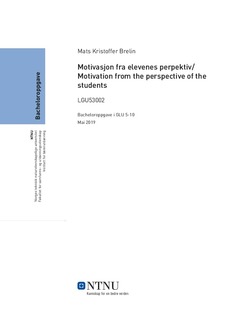Motivasjon fra elevenes perpektiv
Bachelor thesis
Permanent lenke
http://hdl.handle.net/11250/2610230Utgivelsesdato
2019Metadata
Vis full innførselSamlinger
- Institutt for lærerutdanning [3816]
Sammendrag
Denne oppgaven forsøker å undersøke om de store motivasjonsteoriene er relevante fra elevens synspunkt og hvilke som eventuelt er mest relevante. Dette innebærer mestringsforventning, indre og ytre motivasjon, viktigheten av sosiale relasjoner og målorientering. Dette er gjort ved en spørreundersøkelse på ti spørsmål på et tiendetrinn hvor 64 av ca. 120 elever besvarte undersøkelsen. Flesteparten av spørsmålene er «på en skala fra en til fem» spørsmål som gjør analyse og kvantifisering enkelt, og de to resterende spørsmålene er åpne spørsmål som tolkes med profesjonelt skjønn. Hvert av spørsmålene er tenkt ut slik at hver av dem kan knyttes til en motivasjonsteori som gjør det mulig å måle relevansen til hver enkelt motivasjonsteori. Hvert av spørsmålene er deretter analysert for å forsøke å forstå hvorfor elevene har svart slik de har gjort. Det mest sentrale funnet i oppgaven er at alle motivasjonsteoriene fortsatt er viktige, men det kan fortsatt utredes en liste over hvilke teorier som er mest relevante. Listen er som følger:1. Indre motivasjon2. Mestringsforventning3. Ytre motivasjon4. Sosiale relasjoner5. Målorientering Som følge av dette finner vi ut hvilke teorier som er mest relevante og kan drøfte hvilke muligheter dette gir læreren, for å best mulig fremme de forskjellige typene motivasjon. This thesis aims to investigate whether some of the well-known motivational theories are relevant when viewed from the perspective of the students, and which theories are the most relevant. This includes, Mastery expectation, internal and external motivation, the importance of social relations and achievement goal theory. This was done by conducting a survey consisting of ten questions on the tenth-grade level, where 64 out of around 120 students responded to the survey. Most of the questions were “on a scale from 1 to 5” type questions which makes analyzing and quantifying easy, while the two remaining questions were open ended, and therefore requires use of critical and professional thinking in order to analyze. Each of the questions were constructed in such a way that they can be tied to a specific motivational theory, which makes it possible to gauge the relevance of each of the motivational theories. After that, each question was analyzed to try to understand why the students answered the way they did. The most crucial findings in the survey is that all of the motivational theories were still important, but a list ranking the relevance of each motivation theory can still be made. The list goes as follows:1. Internal motivation2. Mastery expectation3. External motivation 4. Social relations 5. Achievement goal theoryAs a consequence of this, we can determine which of the motivational theories is most relevant and discuss which possibilities this opens for the teacher, in terms of promoting the different types of motivation.
